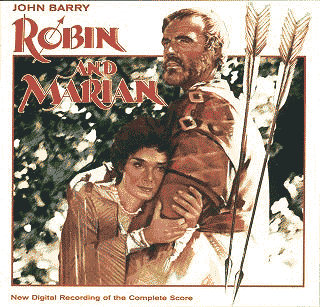************************************************************** EDITOR’s Recommendation October 2001 **************************************************************
John BARRY Robin and Marian
OST
The City of Prague Philharmonic Orchestra conducted by Nic Raine SILVA SCREEN FILMCD 354 [45:04]

Robin and Marion (1976) is one of three simultaneously issued re-recordings of scores by John Barry on the Silva Screen label, the other two being The Lion in Winter (1968) and The Last Valley (1970). As the title suggests, the film tells the love story of Robin Hood and Maid Marion, but is a sequel of kinds, recounting events twenty years after the famous tales. It is a romantic, melancholy tale, and despite starring Sean Connery, Audry Hepburn, Richard Harris and Robert Shaw, failed to find an audience. There is a direct link to The Lion in Winter, the best of the three scores re-recorded by Silva, and indeed, the finest score Barry has ever composed, in that both films were written by James Goldman. Barry's music, while highly effective with the film itself, is not as effective an experience in isolation as the score for the earlier picture. The problem may be that it was a replacement, written in three weeks, when the original score by Michel Legrand was rejected by producer Ray Stark. Barry's score itself was partly reworked, with the American composer Richard Shores re-scoring some of the action music and reorchestrating Barry's "riding motif". This new album includes both Shores' rearrangements and Barry's original music in two versions of "The Ride to Sherwood/The Ride to Nottingham". The album also includes the Barry cues "Over the Wall/Escape", replaced in the film by "Trapped," the one original cue written by Shore. It is obvious to anyone that Barry's work is superior, having a greater artfulness and subtlety.
Inevitably Barry's famed romantic strings are much in evidence, though the melodic heart of the score is most memorably carried on a selection of wind instruments, flute, oboe, bassoon. The action cues are dominated by simple drumming, carrying a fatalistic portent and dramatic urgency. The central love theme has a beautiful poignancy yet is somehow not as memorable as the composer's very finest romantic melodies. It may be that the very obscurity of this score (there has never been an official soundtrack release) has elevated it in the minds of those who have not seen the film for a long time, so that as a self-contained album it somehow fails to inspire. Well crafted certainly, but not essential Barry. The performances are good, though the digital sound is so perfect it lacks a little character, missing that distinctive 1970's sound which made such Barry soundtrack albums as King Kong (1976) such a pleasure.
Gary S. Dalkin

Mark Hockley adds:-
After a score written by Michel Legrand was rejected by the film’s producers, Oscar winning composer John Barry was brought in to save the day. Of course, without having the opportunity to listen to Legrand’s original music, it’s impossible to say whether Barry’s contribution was an improvement. But whatever the case, to be frank this is not one of his more notable compositions, allowing for the fact that the music is never anything less than agreeable.
Although the actual ‘Main Title’ is surprisingly dissonant and atmospheric, the true central theme is first introduced on ‘The Ride to Sherwood/The Ride to Nottingham (Film Version)’, a very typical Barry piece of melodic, lyrical romanticism, here incorporating a jaunty rhythm with plenty of percussive energy. However, this version was rearranged by Richard Shores in a higher key than Barry intended (at the request of those demanding producers), making it both a good deal livelier and lighter than the original (a version of which is also included on the disk). Certainly the original take is more sedate, but for me it works far better in the quieter moments, the orchestration more emotive and affecting. Setting aside this artistic discrepancy, the rest of the work is entirely dominated by this key theme, although more often than not it appears in more genteel romantic form (‘First Love Theme’, ‘Second Love Theme’ etc.) and these incarnations are very much in the composer’s Somewhere in Time style, although unquestionably that wonderful theme was vastly superior. Even so, it’s all still quite likeable in a refined and sweet-natured way. In other places we encounter this theme in more subtle variations, as with the pastoral ‘Dawn in Sherwood’, while what remains elsewhere only amounts to a few brassy, reasonably suspenseful pieces such as ‘In the Church/This Way’ and ‘In Position/Preparation For Battle’ and although these are effective enough they never really rise above being merely satisfactory.
On the bonus side the sleeve notes are quite informative, although there is one amusing gaff when the credits proclaim that Will Scarlet was played by none other than Will Scarlett! A case of real typecasting it would seem (actually the role was performed by Denholm Elliott). Indeed, it’s worth noting that this film featured some truly outstanding actors (Sean Connery, Nicol Williamson, Robert Shaw, Richard Harris and Ian Holm).
The problem with this score and it applies to so many others, is its over reliance on a single motif. I’ve said it before and will no doubt say it on a regular basis in the future, but after a while even the most attractive theme can lose its appeal. The music ultimately lacks the depth and overall emotional texture that gives so much of Barry’s best work real resonance. All the same, as with most of the output from this particular composer, there are always pleasing moments and it makes for a solidly enjoyable listening experience. Just don’t expect this to figure near the top of your list of John Barry favourites.
Mark Hockley
Return to Index